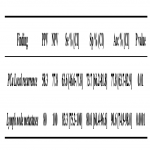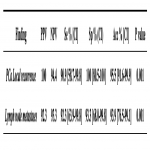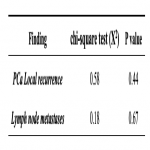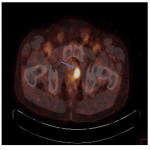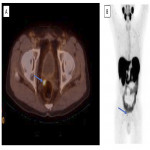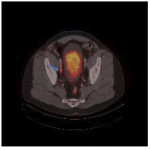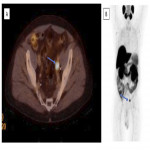Keywords:
Genital / Reproductive system male, Nuclear medicine, Oncology, PET-CT, Molecular imaging, Cancer, Metastases
Authors:
L. Saule, M. Radzina, M. Liepa, A. Lioznovs, L. Roznere, L. Zemniece, M. Kalnina, E. Mamis, E. Vjaters
DOI:
10.26044/ecr2022/C-17749
Results
Total 50 patients were divided in two groups - 68Ga-PSMA-11 and 18F-PSMA-1007 group. 32 patients underwent 68Ga-PSMA-11 PET/CT and 28 patients - 18F-PSMA-1007 PET/CT. Mean patient age in groups - 63±7 vs. 66.67±6.8 years, age range 49–81 vs. 52-84. Mean PSA value at the time of the studies were 2.27 ng/ml vs. 1.97 ng/ml. Median Gleason score - 7 vs.7 , range 5-10 vs. 5-9. PSA median doubling time 4.6 months vs. 7.9 months.
According to the clinically defined standard of reference, local recurrence of prostate cancer was defined by tumor growth in tissues adjacent to the prostate or in the seminal vesicles. A pathologic 68Ga-PSMA-11 uptake in the prostate or prostate bed was observed in 12/32 patients (38%). Accuracy for local recurrence was 77.8% (p=0.01). In the 18F-PSMA-1007 group local recurrence findings were detected by 18F-PSMA-1007 PET/CT in 36% (n=10/28). Accuracy for 18F-PSMA-1007 PET/CT was 95.5% (p=0.001).
A pathologic 68Ga-PSMA-11 uptake in lymph nodes was reported in 16/32 patients (50%). Accuracy of 68Ga-PSMA-11 PET/CT for local lymph node metastases was 90.6% (p=0.0001). Regional lymph nodes were detected by 18F-PSMA-1007 PET/CT in 46% (n=13/28) patients. Accuracy for 18F-PSMA-1007 PET/CT was 93.9% (p=0.001). Table 1 and table 2 show the diagnostic accuracy, sensitivity, specificity, positive predictive value and negative predictive value of each method - 68Ga-PSMA-11 PET/CT and 18F-PSMA-1007 PET/CT - of the prostate cancer local recurrence and lymph node metastases.
A chi-square test of independence showed that there was no significant association between both PSMA PET/CT accuracies for local recurrence (X2=0.58, p=0.44) and for lymph nodes (X2=0.18, p=0.67), confirming true differences between both methods (Table 3).

